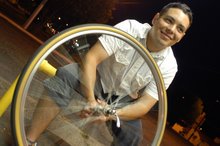I think there was a time when I was sad every time I learned that someone had cheated, but that probably ended with Floyd Landis. I've come to accept that doping is a part of sport, it has been in the past and it always will be in the future. The stakes are just too high for people to resist. But this is true in all professions. You will always have people who take shortcuts to climb to the top.
So I've decided my only response to doping revelations must be glee. Not joy for someone's failure but joy at the fact that the system is at least partly working. I'm a pretty new fan of cycling. The first Tour de France I followed was Lance Armstrong's last (well, before he unretired). I've come in as a fan of cycling at the precise moment when many others started leaving. Friends ask me how I can invest time in cycling when so many of the highlight performances in the past few years have turned out to be lies. And I always tell them the same thing. I'm a sports fan. It's that simple. Sports entertain me and I always remember they are just games.
The only time I get remotely bothered by doping any more is when people act like cycling somehow has a worse doping problem than other sports. Cycling is just ahead of the curve. When A-rod admitted taking performance enhancing drugs he spoke of a lawless culture in baseball at the time. This was true cycling for a long time, but it's my hope that that time is passing. Cycling decided to get serious about ending doping. You could argue this has really only hurt the sport in the mainstream. In cycling, guys are tested all the time. They supply drug testers with their location year-round so they can be found for random tests at any moment. When they get caught they're banned for 2 years. Now teams don't even wait to find banned substances in cyclists' blood, instead they're looking for results that show guys recovering too quickly, which might suggest they were doping. And what has all this gotten them? Little more than scorn.
Two years ago I was in the airport during the prologue of the Tour de France. I stopped by a TV showing ESPN to check the results of the race. Was the story about how more than a million people showed up in London to watch the tour? No, the story was asking the question of whether anyone even cared that the Tour de France was going on because of it's history of doping (yes, despite the million plus people at the event that day). Last year when guys got busted at the tour I read commentators calling for the entire tour to be canceled. And Olympic officials were saying maybe cycling should be kicked out of the games. Funny, I've never once heard anyone suggest that track and field be removed from the games.
On the flip side, the MLB and the NFL have a joke of a drug testing program when compared with cycling's and weak penalties for failing drug tests. For years there were no penalties at all for doping and no tests to even check whether athletes were doping. When baseball finally did add testing (only during the season and not the off season) it was a 10 game suspension for a first offense. They've bumped that up to 50 games now. To match cycling they'd have to tack on another 274 games. How about in the NFL? While they have off season testing, their penalties are 4 games, then 8 games and then a year. So a player could in theory test positive twice in a single season and still play in the playoffs. These policies treat doping like it's not that big of a deal and they want their fans to think it isn't a problem. Baseballs biggest stars have gotten caught cheating and I've yet to hear anyone suggest that they cancel the World Series. Last time I checked Shawne Merriman is still doing commercials and going to the Pro Bowl (well, not this year).
So I'm happy when cycling catches a doper, because I know the sport isn't any dirtier than other sports, it's just that they're trying a lot harder to bust these guys.
Feb 11, 2009
Subscribe to:
Post Comments (Atom)







No comments:
Post a Comment